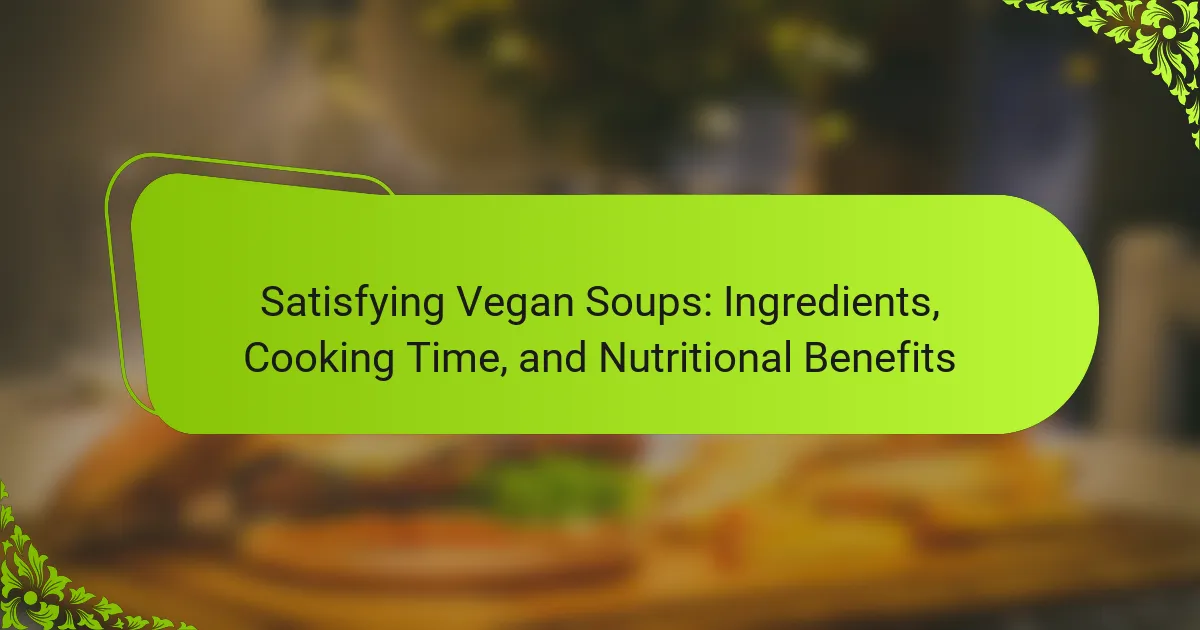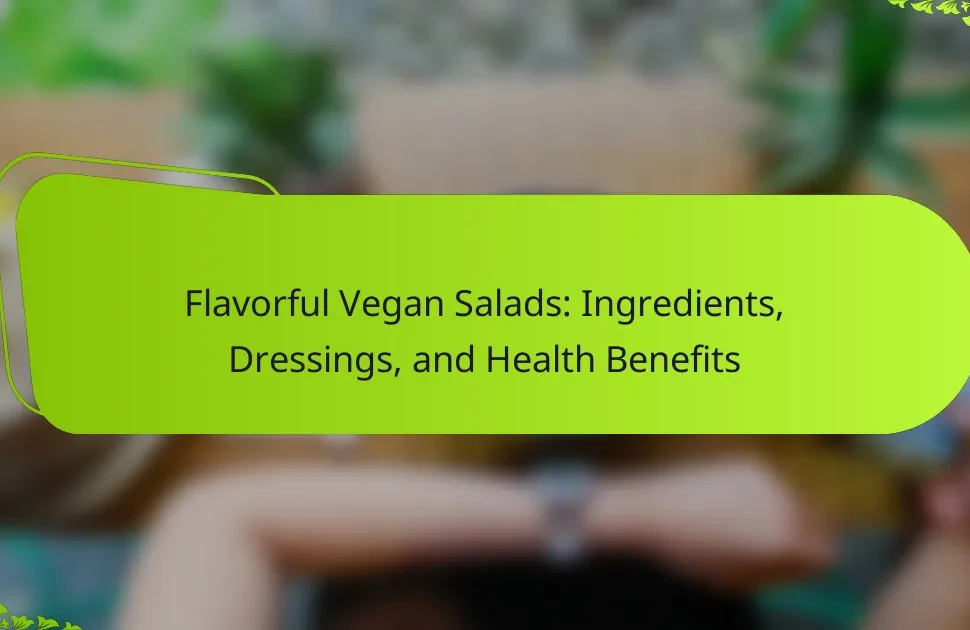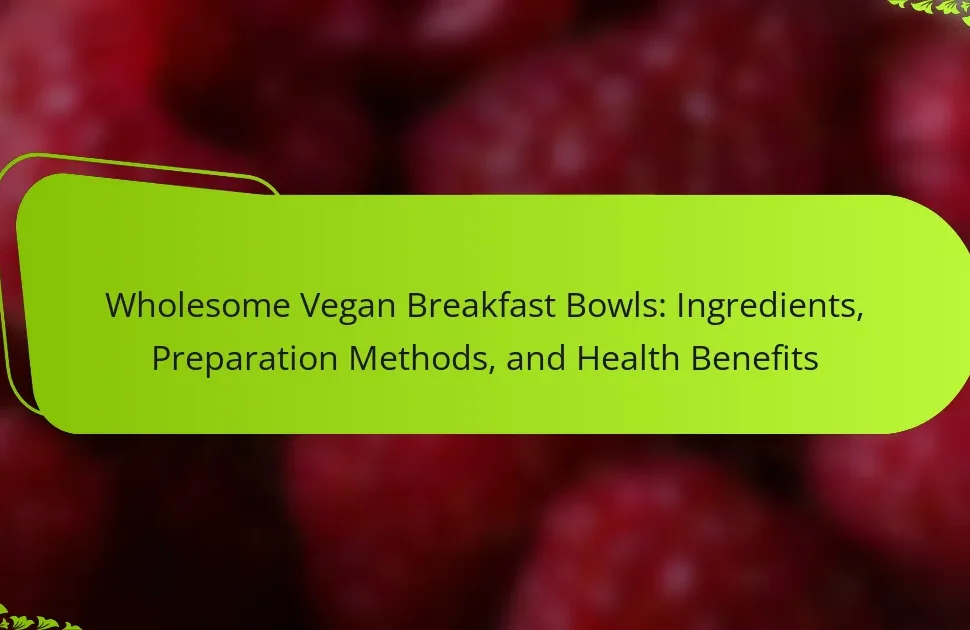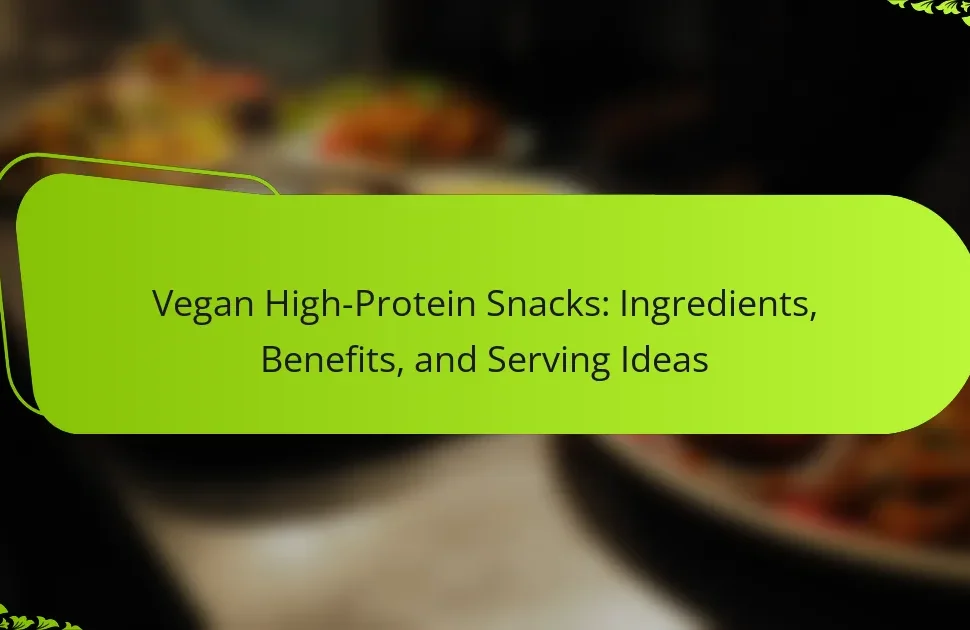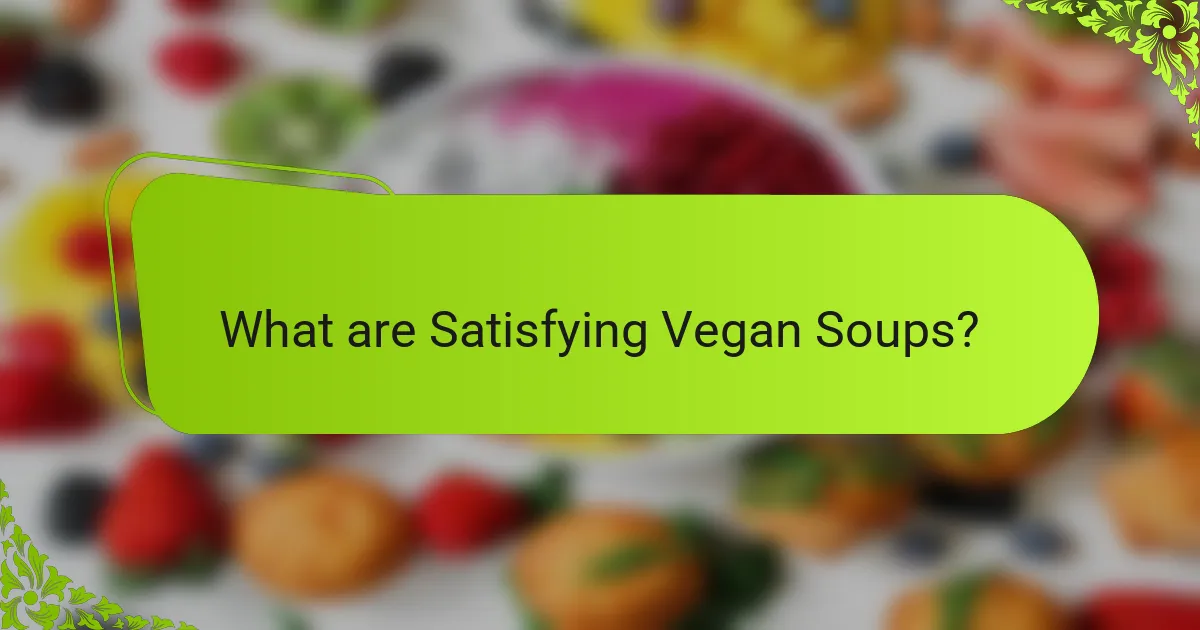
What are Satisfying Vegan Soups?
Satisfying vegan soups are plant-based soups that provide fullness and nourishment. They are typically made with a variety of vegetables, legumes, grains, and spices. These soups often include ingredients like lentils, beans, and quinoa for protein. They may also feature rich broths made from vegetable stock. Many satisfying vegan soups are hearty, with added ingredients like potatoes or rice. They can be seasoned with herbs and spices to enhance flavor. Nutritionally, they are often high in fiber and vitamins. Research shows that plant-based diets can improve health outcomes, making these soups a healthy choice.
How do Satisfying Vegan Soups differ from traditional soups?
Satisfying vegan soups differ from traditional soups primarily by their ingredient composition. Vegan soups exclusively utilize plant-based ingredients, avoiding any animal products. Traditional soups often include meat, dairy, or broth derived from animals. This results in a different flavor profile and nutritional content. Vegan soups typically emphasize vegetables, legumes, grains, and plant-based proteins. These ingredients provide fiber, vitamins, and minerals while being lower in saturated fat. Additionally, vegan soups may require different cooking techniques to enhance flavors, such as using spices and herbs more intensively. Studies show that plant-based diets can lead to improved health outcomes, including lower cholesterol levels.
What key ingredients define Satisfying Vegan Soups?
Key ingredients that define satisfying vegan soups include vegetables, legumes, grains, and spices. Vegetables like carrots, celery, and onions provide a flavorful base. Legumes such as lentils and chickpeas add protein and heartiness. Grains like quinoa or rice contribute texture and substance. Spices enhance flavor profiles, making the soup more appealing. These ingredients combine to create a balanced and nutritious meal. Research indicates that plant-based diets can improve overall health, reinforcing the importance of these components in vegan soups.
How do flavor profiles vary in Satisfying Vegan Soups?
Flavor profiles in satisfying vegan soups vary based on ingredients and preparation methods. Different vegetables contribute distinct tastes. For example, tomatoes add acidity, while carrots introduce sweetness. Herbs and spices enhance complexity. Basil provides freshness, while cumin adds warmth. Broths can range from savory to spicy, influencing the overall flavor. Cooking methods also affect taste; slow simmering develops deeper flavors. Each ingredient’s quality impacts the final profile, ensuring a unique experience.
What are the common types of Satisfying Vegan Soups?
Common types of satisfying vegan soups include lentil soup, minestrone, and butternut squash soup. Lentil soup is rich in protein and fiber. It typically combines lentils, vegetables, and spices. Minestrone is a hearty Italian soup with vegetables, beans, and pasta. It offers a variety of nutrients and flavors. Butternut squash soup is creamy and sweet, often blended with coconut milk or vegetable broth. These soups are popular for their nutritional benefits and comforting qualities.
What ingredients are used in classic vegan soup recipes?
Classic vegan soup recipes typically include vegetables, legumes, grains, and herbs. Common vegetables are carrots, celery, onions, and garlic. Legumes such as lentils and chickpeas provide protein. Grains like quinoa or brown rice add texture and substance. Herbs and spices, including thyme, basil, and pepper, enhance flavor. Vegetable broth serves as the base for these soups. Ingredients can vary based on regional preferences and seasonal availability. These components create a nutritious and satisfying meal option.
How can different vegetables enhance the taste of Satisfying Vegan Soups?
Different vegetables can significantly enhance the taste of satisfying vegan soups. Each vegetable contributes unique flavors and textures. Carrots add sweetness and earthiness. Onions provide a savory base and depth. Garlic introduces a pungent aroma and richness. Celery offers a crisp texture and subtle bitterness. Tomatoes deliver acidity and umami. Leafy greens like spinach or kale add freshness and nutritional value. Bell peppers bring sweetness and color. Mushrooms infuse a meaty flavor and umami richness. The combination of these vegetables creates a complex and satisfying flavor profile in vegan soups.
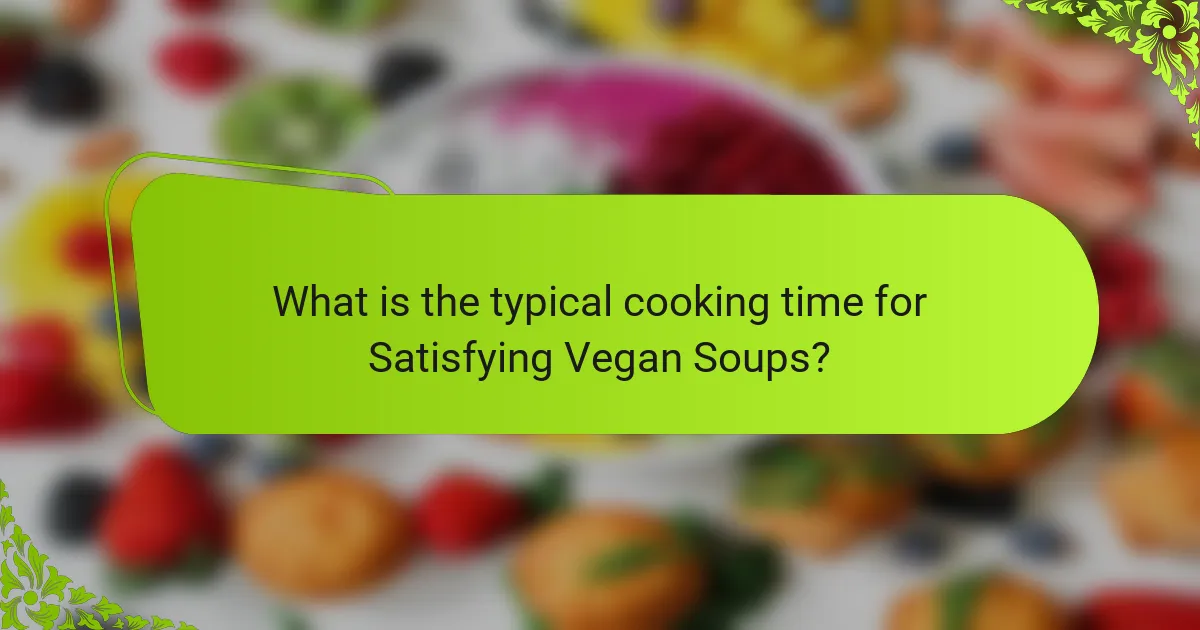
What is the typical cooking time for Satisfying Vegan Soups?
The typical cooking time for satisfying vegan soups ranges from 30 to 60 minutes. This duration allows for proper blending of flavors and thorough cooking of ingredients. For example, vegetable-based soups usually take about 30 to 45 minutes. Soups that include legumes or grains may require closer to 60 minutes to ensure tenderness. Cooking times can vary based on the specific ingredients used and their sizes. For instance, chopped vegetables cook faster than whole ones. Using a pressure cooker can significantly reduce cooking time, often to 10 to 15 minutes.
How does ingredient selection affect cooking time?
Ingredient selection significantly affects cooking time in vegan soups. Different ingredients have varying cooking durations due to their texture and density. For instance, root vegetables like carrots and potatoes typically require longer cooking times compared to softer vegetables like spinach or zucchini. Additionally, legumes such as lentils and beans need soaking and longer cooking times to become tender.
The size and cut of ingredients also play a crucial role. Smaller pieces cook faster than larger chunks. Furthermore, the cooking method influences timing; simmering may take longer than boiling. According to culinary studies, ingredient composition can alter cooking efficiency, impacting overall meal preparation time.
What are the recommended cooking methods for Satisfying Vegan Soups?
The recommended cooking methods for satisfying vegan soups include simmering, sautéing, and blending. Simmering allows flavors to meld and ingredients to cook thoroughly. It typically involves cooking on low heat for an extended period. Sautéing vegetables before adding them to the soup enhances their flavor. This method involves cooking in a small amount of oil over medium heat. Blending is often used to achieve a creamy texture without dairy. It can be done with an immersion blender or a standard blender. Each method contributes to a rich, satisfying flavor profile in vegan soups.
How can you speed up the cooking process for Satisfying Vegan Soups?
To speed up the cooking process for satisfying vegan soups, use a pressure cooker. Pressure cookers can reduce cooking time by up to 70%. Chop vegetables into smaller pieces for quicker cooking. Soaking beans overnight can also decrease their cooking time significantly. Using pre-cooked or canned beans can eliminate the need for soaking and lengthy cooking. Opt for quick-cooking grains like quinoa or couscous instead of longer-cooking options. Simmer soups on higher heat initially, then reduce to maintain flavor without extended cooking. Lastly, prepare ingredients in advance to streamline the cooking process.
What factors influence the overall cooking duration?
Cooking duration is influenced by several key factors. These include the type of ingredients used, their size, and the cooking method applied. For instance, tougher vegetables like carrots take longer to cook than softer ones like spinach. The size of the ingredient pieces also matters; smaller pieces cook faster than larger ones. Cooking methods such as boiling, simmering, or pressure cooking significantly affect duration. Pressure cooking reduces cooking time due to increased temperature and pressure. Additionally, the initial temperature of ingredients impacts duration. Cold ingredients require more time to reach the desired cooking temperature. Finally, the recipe’s specific instructions can dictate cooking time based on desired texture and flavor.
How do batch sizes impact cooking time for Satisfying Vegan Soups?
Larger batch sizes generally increase cooking time for Satisfying Vegan Soups. This is due to the greater volume of ingredients requiring more heat to reach the desired temperature. Heat distribution can be uneven in larger batches, leading to longer cooking times. For instance, a 4-quart pot will take longer to simmer than a 2-quart pot. Additionally, larger batches may require more time for flavors to meld effectively. Research indicates that cooking times can increase by 20-30% with larger volumes. Therefore, adjusting cooking times according to batch size is essential for optimal results.
What role does pre-preparation play in reducing cooking time?
Pre-preparation significantly reduces cooking time by streamlining the cooking process. This involves tasks such as chopping vegetables, measuring ingredients, and marinating proteins in advance. By completing these steps beforehand, the cook can quickly combine ingredients during actual cooking. Studies show that meal prep can cut cooking time by up to 30%. Additionally, having ingredients ready allows for better time management and less stress during meal preparation. Overall, pre-preparation enhances efficiency and ensures a smoother cooking experience.
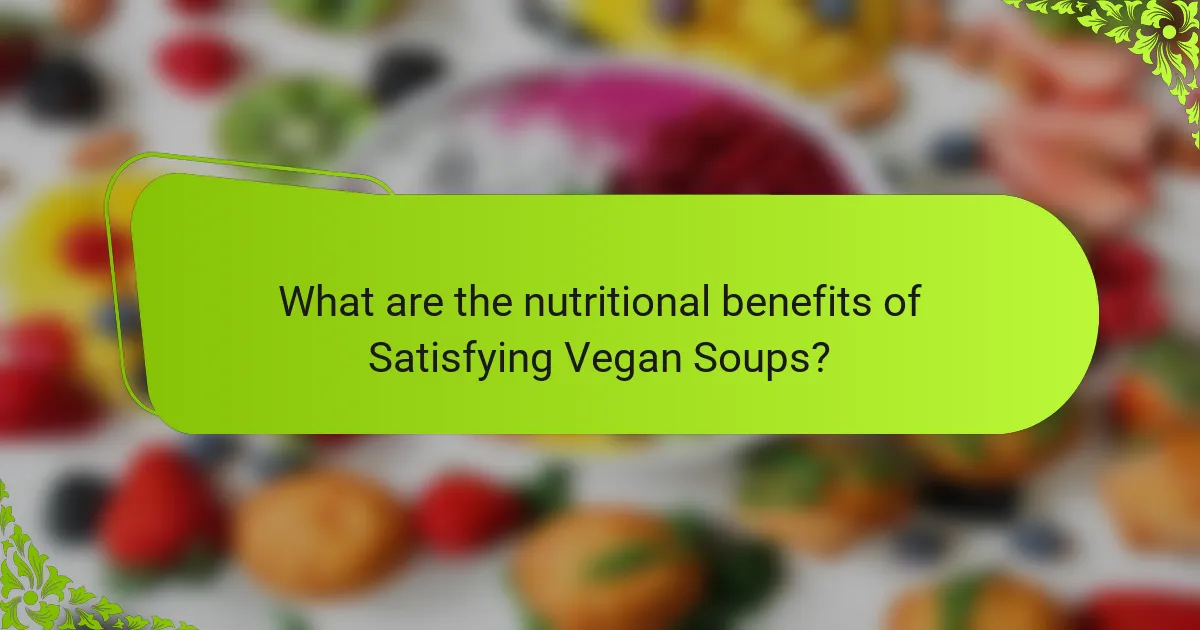
What are the nutritional benefits of Satisfying Vegan Soups?
Satisfying vegan soups offer numerous nutritional benefits. They are typically rich in vitamins, minerals, and antioxidants. Ingredients like vegetables, legumes, and whole grains contribute to a high fiber content. Fiber promotes digestive health and helps maintain a healthy weight. Vegan soups are also low in saturated fats, which supports heart health. The use of various herbs and spices enhances flavor and provides additional health benefits. For instance, garlic and ginger have anti-inflammatory properties. Many vegan soups are hydrating due to their high water content. Overall, these soups can be a nutrient-dense option for a balanced diet.
How do Satisfying Vegan Soups contribute to a balanced diet?
Satisfying vegan soups contribute to a balanced diet by providing essential nutrients and promoting overall health. They are often rich in vegetables, legumes, and whole grains. These ingredients offer vitamins, minerals, and dietary fiber. Fiber aids digestion and helps maintain a healthy weight. Protein from legumes supports muscle health and repair. Additionally, vegan soups are typically low in saturated fats. This can reduce the risk of heart disease and improve cholesterol levels. Consuming a variety of soups can ensure a diverse intake of nutrients. Research shows that plant-based diets can lower the risk of chronic diseases. Thus, satisfying vegan soups are a beneficial addition to a balanced diet.
What vitamins and minerals are commonly found in Satisfying Vegan Soups?
Satisfying vegan soups commonly contain vitamins and minerals such as vitamin A, vitamin C, iron, and potassium. Vitamin A is often derived from vegetables like carrots and sweet potatoes. Vitamin C is typically found in ingredients such as tomatoes and bell peppers. Iron can come from legumes like lentils and beans. Potassium is frequently present in vegetables like spinach and potatoes. These nutrients contribute to the overall health benefits of vegan soups.
How do Satisfying Vegan Soups support weight management?
Satisfying vegan soups support weight management by being low in calories and high in fiber. These soups often contain vegetables, legumes, and whole grains. High fiber content promotes satiety, reducing overall calorie intake. Low-calorie ingredients help maintain a caloric deficit, essential for weight loss. Research shows that meals rich in fiber can enhance feelings of fullness. For instance, a study published in the Journal of Nutrition found that high-fiber diets are linked to lower body weight. Additionally, vegan soups are nutrient-dense, providing essential vitamins and minerals without excess calories. This combination makes them an effective tool for those managing their weight.
What are some health benefits associated with consuming Satisfying Vegan Soups?
Consuming satisfying vegan soups offers numerous health benefits. These soups are often rich in vitamins and minerals from vegetables. They provide dietary fiber, which aids digestion and promotes gut health. Many vegan soups are low in calories, supporting weight management. Plant-based ingredients can reduce the risk of chronic diseases. Antioxidants present in vegetables help combat oxidative stress. Additionally, vegan soups can enhance hydration due to their water content. Overall, they contribute to a balanced and nutritious diet.
How can Satisfying Vegan Soups improve digestive health?
Satisfying vegan soups can improve digestive health by providing fiber-rich ingredients. High fiber content helps regulate bowel movements. Ingredients like beans, lentils, and vegetables are common in these soups. They promote healthy gut bacteria, enhancing overall digestion. Additionally, soups are often hydrating, which aids in digestion. Warm soups can soothe the digestive tract, reducing discomfort. Studies show that a diet rich in plant-based foods supports gut health. For example, a study published in the journal “Nutrients” highlights the benefits of plant-based diets for digestive wellness.
What impact do Satisfying Vegan Soups have on heart health?
Satisfying vegan soups positively impact heart health. They are typically low in saturated fat and high in fiber. Ingredients like legumes, vegetables, and whole grains provide essential nutrients. These nutrients support heart function and reduce cholesterol levels. Studies show that diets rich in plant-based foods lower the risk of heart disease. For example, a study published in the Journal of the American College of Cardiology found that plant-based diets can significantly reduce cardiovascular risk factors. Thus, including satisfying vegan soups in a diet contributes to better heart health.
What are some practical tips for making Satisfying Vegan Soups?
Use a variety of vegetables for flavor and texture in vegan soups. Incorporate ingredients like carrots, onions, and garlic. These vegetables provide a solid flavor base. Add legumes such as lentils or chickpeas for protein. This enhances the soup’s nutritional profile. Use vegetable broth instead of water for added depth. Season with herbs and spices like thyme, cumin, or paprika. These enhance the overall taste significantly. Blend some of the soup for creaminess while leaving chunks for texture. This creates a satisfying mouthfeel. Lastly, allow the soup to simmer longer for flavors to meld. This results in a richer, more satisfying dish.
Satisfying vegan soups are plant-based meals that provide nourishment and fullness, commonly made with vegetables, legumes, grains, and spices. This article outlines the key ingredients that define these soups, how they differ from traditional soups, and their nutritional benefits, including high fiber content and low saturated fat. It also details cooking times, methods, and practical tips for preparation, emphasizing the health advantages associated with a plant-based diet. Additionally, the article explores how various ingredients impact flavor profiles and overall cooking duration, making it a comprehensive guide to creating satisfying vegan soups.
